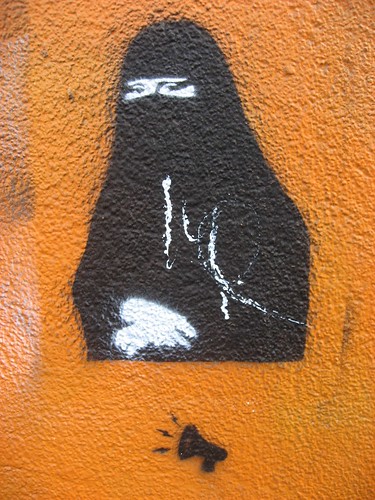In case anyone missed it President Sarkozy recently decided to attack the Burka
In our country we cannot accept that women be prisoners behind a screen, cut off from all social life, deprived of all identity,” Mr Sarkozy said to applause in the parliament’s ceremonial Versailles home. The burka is not a religious sign. It is a sign of subservience, a sign of debasement,” he added. “It will not be welcome on the territory of the French Republic.”
So ok the man has a point. Equality cannot be achieved in a society when one group has the power to enforce dress codes on another group. The intentions behind forcing a sub-group to behave or dress in a special manner is irrelevant. As the saying goes: “the road to hell is paved with good intentions…”

Photo: Stencils Oslo May 2009 by svennevenn (CC BY-NC-SA)
So even we can agree with Sarkozy what can be done? Sarkozy seems to be attempting to regulate the wearing of a specific style of clothes in public. This is not the same as refusing to allow different types of clothes inside public buildings such as schools or courts. Attempting to enforce such a rule would in itself be a form of denial of freedom. Can you imagine police arresting burka wearing women on the street? This would hardly strengthen the image of France as a democracy.
Another question is what other forms of dress would be prohibited? Are we to focus on the fully dressed aspect then maybe wearing hoods, scarves and masks would be considered wrong. On the other hand if we were to see the lack of individual freedom as an important aspect then wouldn’t all the slaves to fashion be violating the intent of the law?
Times Online has a list of dress related regulation:
— In France a law was passed in 2004 banning pupils from wearing “conspicuous” religious symbols at state schools, a move widely interpreted as aimed at the Muslim headscarf
— In Turkey where 99 per cent of the population is Muslim, all forms of Muslim headscarf have been banned in universities for decades under the secular government. In June 2008 the country’s Consitutional Court overruled government attempts to lift the ban, prompting protests
— In Britain guidelines say that the full Islamic veil should not be worn in courts, but the final decision is up to judges. Schools may forge their own dress codes and in 2006, courts upheld the suspension of Aishah Azmi, a Muslim teaching assistant who refused to remove her veil in class
— German states have the option of choosing to ban teachers and other government employees from wearing Muslim headscarves; four have done so
—The Italian parliament in July 2005 approved anti-terrorist laws that make hiding one’s features from the public — including through wearing the burla — an offence
— Tunisia, a Muslim country, has banned Islamic headscarves in public places since 1981. In 2006 authorities began a campaign against the headscarves and began strictly enforcing the ban
— The Dutch Government said in 2007 that it was drawing up legislation to ban burkas, but it was defeated in elections in November and the new centrist coalition said it had no plans to implement a ban
